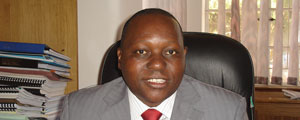
I attended a pre-Budget seminar for Parliament and ministers two weeks ago at which the Speaker of the House of Assembly, Lovemore Moyo, bemoaned the poor treatment of Parliament by the Executive.
Opinion by John Makamure
The Speaker had some harsh words for Cabinet, which he accused of treating Parliament as a mere department of the Executive. The Speaker’s sentiments come against the background of poor resource allocation to Parliament, which has disrupted proper planning for sittings and the execution of parliamentary business. The sentiments also emanate from recent statements by President Robert Mugabe, which implied that the principals had the right to take away powers conferred to the legislative branch in the constitution-making process.
“To be blunt and brief, our perennial complaint as the Legislature since the commencement of the First Session of the Seventh Parliament has always had to do with the attitude of the Executive towards the Legislature and the treatment extended to it. This unhealthy attitude is best demonstrated in the manner in which the Treasury deals with Parliament in its day-to-day operations.
“Indeed, Zimbabwe must be one of the few countries in the world where one of the three arms of the State is treated, for operational purposes, as an ordinary government ministry or department and where junior ministry officials are free to accept and dismiss without hesitation, the legitimate requirements of an arm of the State,” said the Speaker to the applause of members across the political divide.
I totally agree with the Speaker that the Seventh Parliament is made up of democratically elected MPs and that it is not a creation of the Global Political Agreement. It is the presidential election that was disputed in 2008, not parliamentary elections. Because the inclusive government was born out of negotiations between political parties, it has no full mandate from the people.
Parliament, however, has the mandate and, therefore, deserves better treatment as a legitimate forum representing the people. Parliamentary independence has to be respected in line with the constitutional dictates of separation of powers between the three arms: Legislature, Judiciary and Executive.
The question, however, is how in practice can Parliament exercise this independence?
- Chamisa under fire over US$120K donation
- Mavhunga puts DeMbare into Chibuku quarterfinals
- Pension funds bet on Cabora Bassa oilfields
- Councils defy govt fire tender directive
Keep Reading
The answer lies in the enactment of the necessary provisions in the new constitution to promote parliamentary independence, especially when it comes to control over its own budget.
Best practice worldwide is the establishment of an independent Parliamentary Service Commission (PSC). This commission is a constitutional body basically created to promote administrative and financial autonomy of Parliament.
In Zimbabwe, the functions of the PSC are currently performed by the Standing Rules and Orders Committee (SROC). While it is a constitutional creation, the composition of its membership has weakened it.
Too many members from the Executive sit on the SROC.
These are largely senior members of their respective parties. It is, therefore, difficult for junior members (the back benchers) to go against the decisions of their seniors, who, in most cases, are there to protect the interests of the Executive.
Scheduling of SROC meetings has been very difficult due to the absence of some of the key members. Failure to meet regularly has negatively affected decision-making by this important policy-making organ of Parliament.
Experiences from elsewhere have shown that parliamentary service commissions are viable mechanisms for promoting parliamentary independence and effectiveness. Uganda and Kenya parliaments have become two of the most independent in Africa due to the establishment of parliamentary service commissions.
While the new draft constitution has tried to enhance the powers of Parliament in areas such as the process by which a Bill becomes law, the promotion of public participation in the business of Parliament and the appearance of ministers and government officials before Parliament, there are no provisions to enable Parliament to fully control its own affairs and budget.
I want to conclude by saying the draft constitution is going to be tabled in Parliament for debate and passage into law. This is an excellent opportunity for the members to include provisions in the new constitution that establishes the PSC. Failure to do so will perpetuate the existence of Parliament as an appendage of the Executive and render it a weak institution.
- John Makamure is the Executive Director of the Southern African Parliamentary Support Trust writing in his personal capacity. Feedback: [email protected]











